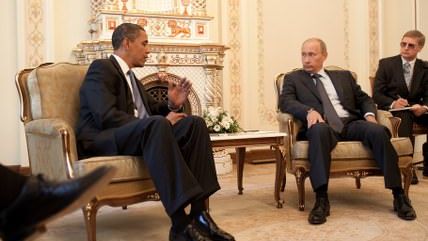Obama and the Appeasement Myth
The stark fact is that Ukraine is not a place over which the U.S. and NATO should be ready to go to war, and nothing short of going to war will change its fate.

Hawks in the wild tend to be solitary creatures. But those in Washington, D.C., often appear in noisy flocks. As Russian President Vladimir Putin continues his predatory activities in Ukraine, conservatives here are unanimous on how the Obama administration should respond: by emulating the Bush administration.
A favorite demand is reviving the European missile defense that George W. Bush began during his final months in office. "We could go back and reinstate the ballistic missile defense program that was taken out," Dick Cheney said. "Obama took it out to appease Putin." Rep. Paul Ryan, R-Wis., agreed that "we should definitely revisit missile defense." Ditto Sens. Marco Rubio, R-Fla., and John McCain, R-Ariz.
The suggestion is odd for several reasons. One is that missile defense would be useless against either a ground assault by Russia or a covert effort to foment rebellion against the Kiev government. Another is that the small anti-missile system Bush had in mind was not designed to counter the Russian nuclear arsenal.
"In fact, it's just not even logically possible for it to be aimed at Russia, given how Russia could overwhelm it," noted White House press secretary Dana Perino in 2008. "The purpose of missile defense is to protect our European allies from any rogue threats, such as a missile from Iran."
But the hawks have a problem. They have a pathological need and a political incentive to fault President Barack Obama for timidity on Ukraine. At the same time, they must distract attention from the fact that they don't actually propose to do anything likely to affect Putin's behavior.
Invoking missile defense allows a pretense of toughness, even if it's only a millimeter deep. It also lets them claim that Ukraine would be intact if only Obama had not invited Russian aggression. Their arguments, however, are a masterpiece of irrelevance.
The case rests on fictions, starting with the claim that he abandoned missile defense in Europe in a naive attempt to pacify the Russians. It's true that the Kremlin denounced the Bush plan. But that was not the reason for the change. The reason was that the system didn't look as though it would be adequate for its assigned task of shooting down Iranian ballistic missiles.
Obama actually didn't abandon missile defense in Europe. Instead, he replaced the Bush plan, which relied on equipment that hadn't been tested, with one making use of existing weapons. Unlike the original program, says Ohio Wesleyan University political scientist Sean Kay, Obama's "is based on proven and capable technology."
This choice, however, allegedly betrayed our faithful allies in Warsaw and Prague. But Robert Gates, who served as secretary of defense under Bush as well as Obama—and who has been critical of Obama on Ukraine—debunked that notion in 2011.
The deployment Bush envisioned in the Czech Republic, he informed a Senate committee, "was not going to happen, because the Czech government wouldn't approve the radar." Also, he noted, "we still hadn't negotiated the required agreements with the Poles." The Obama version circumvented those obstacles.
In his memoir, "Duty," Gates wrote, "I never understood the fury of the U.S. critics. The new plan would get defenses operational in Europe and for our 80,000 troops there years earlier than the Bush proposal." As for the appeasement charge, he scoffed: "Making the Russians happy wasn't exactly on my to-do list."
Nor was anyone doing end-zone dances in the Kremlin. After Obama announced the new system, the Russians charged that it "undermines global stability and violates the current balance of nuclear forces." What American hawks describe as surrender, Putin depicted as hostile.
There is no reason to think reviving Plan A would alter Putin's strategic calculus, much less freeze him in his tracks. Putting that system together would take years, even if the Poles and Czechs cooperated—on top of the technical challenges of making it work. Making it work, though, would not impede Russia from preying on its neighbors with tanks and infantry, which are strangely impervious to ballistic missile interceptors.
The stark fact is that Ukraine is not a place over which the U.S. and NATO should be ready to go to war, and nothing short of going to war will change its fate. American hawks imagine that Bush's missile defense would have been an impressive symbol of Western resolve. But Putin is not the type to be scared of symbols.


Show Comments (44)